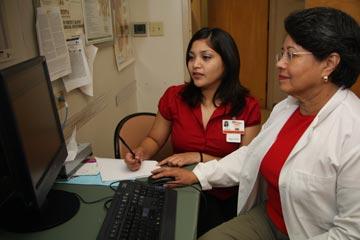
Nurse Practitioner Maria Falkenberg, MSN, RNC, right, oversees activities
of patient navigator Sandra Veronica Covarrubias.
May 30, 2008. Latinas face numerous barriers after they receive an abnormal or suspicious breast cancer screening result. Left to negotiate health system obstacles and confusing choices and decisions, they often delay or even discontinue the care they need out of frustration. Typically, when they do ultimately receive treatment, it’s for a more advanced stage of the disease.
In new research program to be launched this summer, Redes En Acción hopes to alleviate these problems for hundreds of Latina patients in community clinical settings around the country over the next year.
Researchers will study the efficacy of a patient navigator program in improving patient compliance and reducing the time between abnormal screening tests and initiation of treatment. In the process, major objectives are to improve patient satisfaction with their experience in the health care system and provide much-needed psychosocial support.
“By testing this program in multiple settings, we believe this intervention will lead to a prototypical patient navigation model,” said Amelie G. Ramirez, DrPH, Redes Principal Investigator. “This model of cancer care then could be replicated and disseminated in other communities where Latinas confront significant disparities in cancer health care delivery.”
For the study, 50 Latina adults will be recruited in each of the six Redes En Acción sites: New York, Miami, Houston, San Antonio, San Francisco and San Diego. To assist women after they receive an abnormal breast cancer screening result, a trained community lay health worker – the patient navigator – will communicate with them regularly to facilitate clinic visits, resolve nonmedical delays in evaluation of their clinical condition, and connect them with local resources.
Initially, participants will be given a pre-intervention survey exploring their previous personal experience with the health care system. A follow-up survey will be administered to ascertain their feelings about the cancer screening, diagnosis and treatment experience following participation in the study.
The surveys will be part of the research project’s process and outcome evaluations. Implementation process evaluation will involve monitoring the navigator’s activities and interactions with patients and the health system. Outcome data will be derived from patient clinical records, scheduling information, patient satisfaction survey results and interviews with health care personnel.
Over the past two years, Redes En Acción has pilot-tested a separate – but similar – patient navigator project assisting underserved Latinas who use breast and cervical cancer services at two community clinics in San Antonio. Intervention participants have been provided diverse services, such as help with medical appointment scheduling, appointment reminders, transportation, financial aid and additional health information. The project is supported by a grant from the Pfizer Pharmaceutical Group.
“This program has helped patients feel secure that they’ll receive treatment they need and won’t fall through the cracks in a health care system that otherwise can make them feel lost or confused,” said Sandra Veronica Covarrubias, the project’s patient navigator. As part of a medical team at the clinic, Covarrubias works under the day-to-day guidance of Nurse Practitioner Maria Falkenberg, MSN, RNC.
The new, multi-site Redes patient navigator program is expected to last 18 months. After a 12-month intervention, researchers plan to devote the remaining six months to data analysis and reporting.



